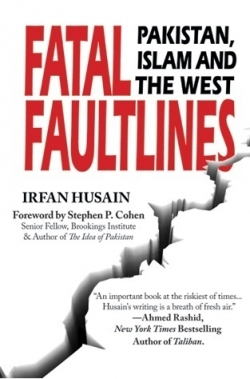Fatal Faultlines
Pakistan, Islam and the West
Outrage and a growing failure of diplomacy best describe the relationship between the Muslim world and the West, especially following 9/11 and the wars in Iraq and Afghanistan over this last decade. The author, an award-winning journalist with more than thirty years experience, who also served as a Pakistani diplomat stationed in Washington D.C., presents a fair-minded assessment of this divisiveness that will likely anger readers in both Pakistan and the US. Indeed, his columns (www.dawn.com), which provide the background for the book, have often caused him to be called a traitor to his own people or a CIA agent.
“The long shadow of 9/11” led to a radicalization of younger Muslims because they viewed the war on terror as a war on their religion. Abuses at Abu Ghraib prison further inflamed anti-American ideology, although the author points out that Saddam Hussein was much more brutal to his own Muslim prisoners. Currently, pro-Israeli policies and recent killings of innocent Pakistanis by US Hellfire Missiles and drones make stable relations between the countries problematic, to say the least. The author calls this condition the “Pakistani Paradox,” describing how Pakistan, once the United States’ most reliable ally in the region, has become one of the most anti-American nations.
Radical Muslims, the author claims, unfortunately have continued “Ground Zero through cyberspace,” using the Internet to spread hatred to recruit new members. Although this is a small number, not likely more than 5 percent, it has led to the perception among Americans that all Muslims are to be suspected of protecting terrorists. As a countermeasure, Husain calls for a vastly improved education system in Pakistan, one that will prevent brainwashing of youth and that offers opportunities for employment.
The author initially believed that this book would end bleakly, with little hope of good relations being restored. Then, the 2011 Arab Spring made him “cautiously optimistic,” as he observed the public overthrow of tyrants in Tunisia and Egypt by a largely youth rebellion. Husain’s optimism comes from the absence of anti-American actions in those events, and he hopes the younger generation will ultimately reject anti-Americanism. For the time, a wait-and-see attitude is the most realistic one. This open-minded, thoughtful narrative offers insight for serious readers of international affairs.
Reviewed by
Karl Helicher
Disclosure: This article is not an endorsement, but a review. The publisher of this book provided free copies of the book and paid a small fee to have their book reviewed by a professional reviewer. Foreword Reviews and Clarion Reviews make no guarantee that the publisher will receive a positive review. Foreword Magazine, Inc. is disclosing this in accordance with the Federal Trade Commission’s 16 CFR, Part 255.

